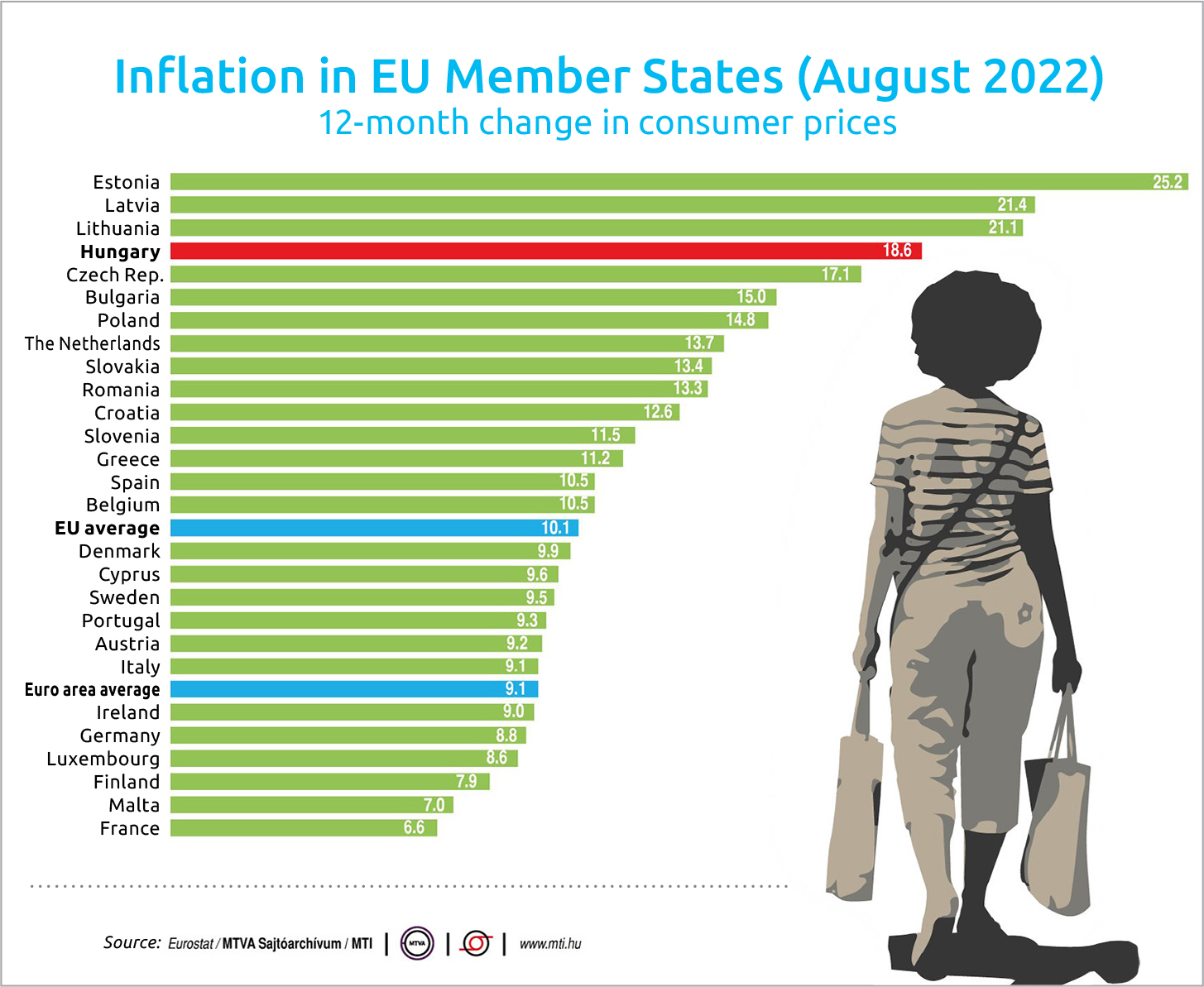Inflation Keeps Breaking Records, But Still Seems Far From its Peak

Consumer prices in Hungary are rising at a nearly unprecedented pace, and, according to analysts, there is no turning point visible on the immediate horizon.
The rate of inflation climbed above 10% in the European Union, with Hungary among those countries way above the EU average. In August, the consumer price index in Hungary accelerated to 15.6%, up from 13.7% in July, breaking another 24-year record.
The rising price pressure is reflected in the fact that core inflation jumped sharply to 19%, far exceeding expectations. The surprise was caused by the higher-than-expected increase in food prices and other consumer goods and services.
Due to inflation that is much higher than expected, the substantial weakening of the forint, the public health product tax, and the increase in the excise tax on tobacco products and alcoholic beverages, continued repricing due to the sharp increase of raw materials and energy costs in many product lines, and the partial lifting of the freeze on household energy prices, Takarékbank is raising average inflation expectations for this year and next to 13.4% and 11.9%, said head analyst Gergely Suppan.
He added that inflation could be increased by another four or five percentage points if the price restrictions on certain foods and fuels were abolished entirely, which could have resulted in average inflation of 14.3% this year and 14% next year. Suppan added that the abolition of price restrictions could also lead to a faster decrease in inflation, albeit from a much higher level, once the price of the affected products fell.
(Subsequent to him making those comments, the government has announced the prolongation of price caps until the beginning of next year.)
Permanent Inflation?
It was necessary to start the interest rate hike cycle due to the high inflation that, increasingly, seems to be permanent. In addition, the secondary effects of raw material and energy prices also represent an upward risk, together with the exploding demand after the reopening, with which supplies struggled to keep pace, Suppan said. Wages are also expected to jump significantly due to the labor shortage; all this leads to an increase in inflation expectations, meaning the National Bank of Hungary will continue the interest rate hike cycle.
Surging gas and electricity prices appear in many sectors and almost all industrial processes, from bakery goods and catering to fertilizers for food production, to the chemical industry, metal processing, and construction material production, also causing significant price increases.
In the coming months, due to repricing, tax increases, and the partial removal of the freeze on household energy prices, inflation will continue to rise significantly, which could reach 22% without the price-limiting measures and would exceed 25% without the freeze on household energy prices below average consumption. The maintenance of price restrictions preceded a significant price shock, the analyst noted.
Although inflation in August accelerated to 15.6% from 13.7% in the previous month, it developed more favorably than the market consensus had predicted, commented Századvég analyst Gábor Regős.
The monthly inflation actually decreased from 2.3% in July to 1.8% in August, which is still a significant value, but, considering the tax increases in August, it was not a surprise, he said.
Factors at Play
At the same time, the lower value in August means that the effect of the tax increases was already partly visible in the July data. In addition, the high level of inflation, as in the previous months, is primarily caused by soaring energy prices, but the weak forint exchange rate, the disruption of supply chains due to the war, and, increasingly, the very poor harvest due to the drought also play a role.
Compared to the previous month, inflation accelerated for all product groups. The currency deterioration is the biggest concern in the case of foodstuffs, where prices rose by an average of 30.9% year-on-year after a 27% increase in the previous month.
The second most significant growth, 14.8%, was measured for consumer durables. The smallest average price increase of 2.1% was found in household energy; the increase in official energy prices above the average consumption will appear in the September data.
In August, inflation in the Eurozone accelerated from 8.9% to 9.1%; a peak cannot be observed here either, although the monthly rate in several countries was negative. There is a significant difference between individual countries: while Estonian inflation already exceeds 25%, French inflation is only 6.5%, Regős pointed out.
Hungarian inflation is expected to increase further in the coming months due to the weak forint exchange rate, record-high energy prices on the world market, poor harvests, and changes in official energy prices above average consumption, the analyst said.
The stabilization of the energy market and the strengthening of the forint are necessary for inflationary processes to become more favorable. Accordingly, the central bank must further tighten monetary policy, meaning the base interest rate may continue to rise in September, Regős concluded.
Numbers to Watch in the Coming Weeks
The Central Statistical Office will release the August data for Hungary’s industrial production on October 6. On the same day, August retail trade figures will be published. In the meantime, the Monetary Council of the National Bank of Hungary will hold its next rate-setting meeting on September 27.
This article was first published in the Budapest Business Journal print issue of September 23, 2022.
SUPPORT THE BUDAPEST BUSINESS JOURNAL
Producing journalism that is worthy of the name is a costly business. For 27 years, the publishers, editors and reporters of the Budapest Business Journal have striven to bring you business news that works, information that you can trust, that is factual, accurate and presented without fear or favor.
Newspaper organizations across the globe have struggled to find a business model that allows them to continue to excel, without compromising their ability to perform. Most recently, some have experimented with the idea of involving their most important stakeholders, their readers.
We would like to offer that same opportunity to our readers. We would like to invite you to help us deliver the quality business journalism you require. Hit our Support the BBJ button and you can choose the how much and how often you send us your contributions.










